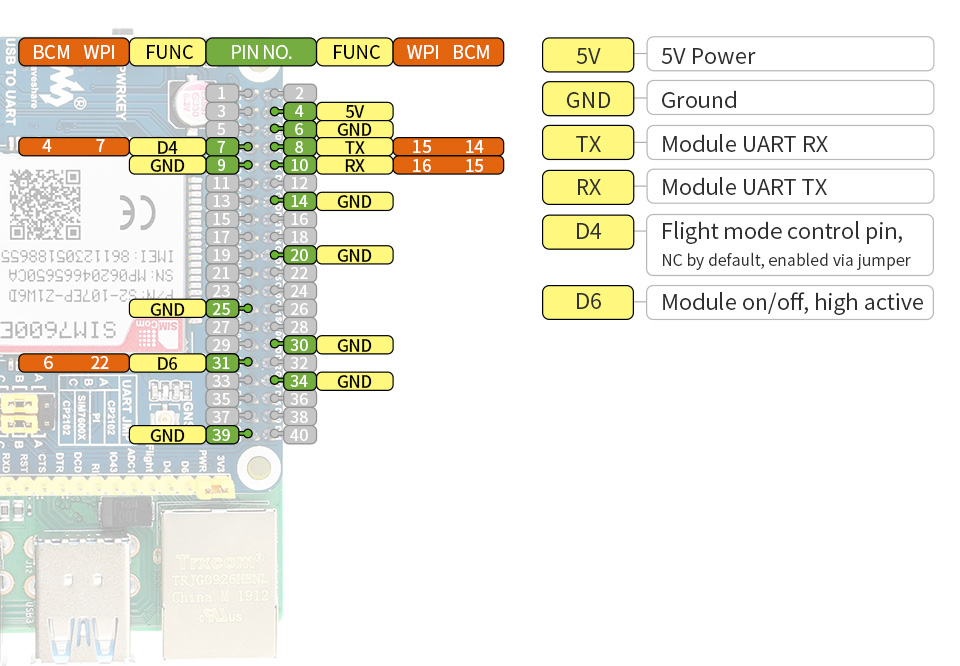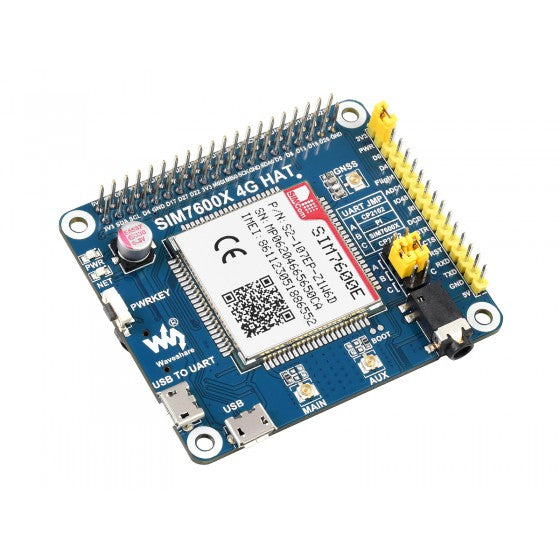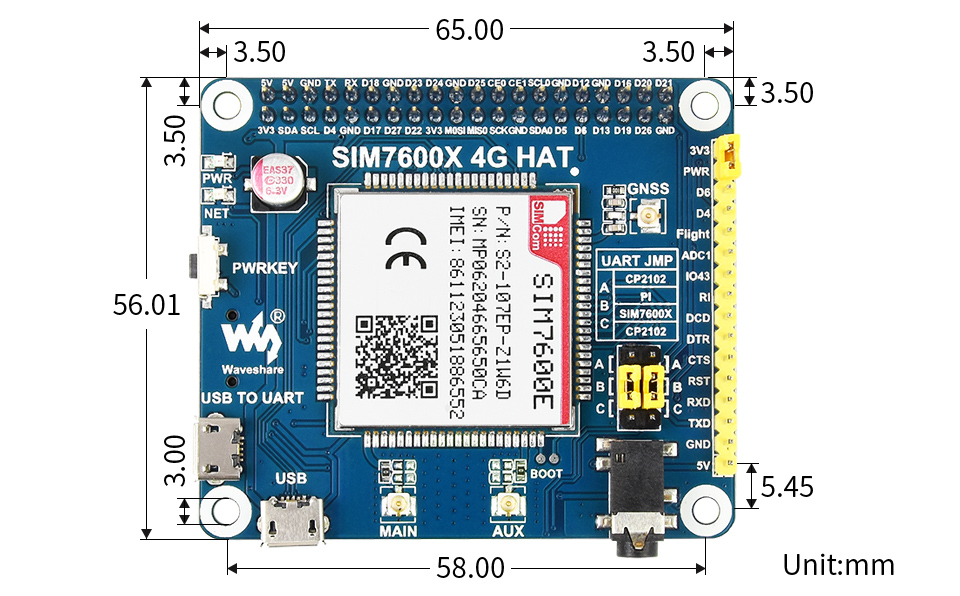Description
The SIM7600E-L1C is a Multi-Band LTE-FDD/HSPA+/UMTS/EDGE/GPRS/GSM module solution in an SMT type that supports LTE CAT1 up to 10Mbps data transfer. It has strong extension capability with rich interfaces including UART, and USB2. 0, GPIO, etc.
Wireless communications in the world of electronics and prototyping have always been a rapidly evolving area, with new networks and protocols being introduced at a wildly rapid pace, which each offer distinct benefits and improvements over previous iterations and technologies. However, while these new networks and protocols are undoubtedly better than what we used to deal with in the past, some of them are quite complex in nature and require advanced knowledge and expertise to get working just right – especially when considering the modem complexity required for both high speeds and stable connections.
Fortunately, as Makers in a beautifully modern world, these higher levels of complexity are not quite as daunting as they would have been in the past, as we can now simply get awesome modules like the SIM7600E LTE Cat-1 HAT for Raspberry Pi, which take away all of those complexities in order to provide a simplified, powerful and very functional way for us to take advantage of LTE and wireless comm’s. These modules are specially designed to make your life as a Maker as easy as possible, while still giving you all the benefits that LTE Cat-1 communications can offer. They are designed in the classic Pi HATs style so as to provide excellent compatibility and ease of use and are built to allow you to get your projects connected with impressive networking capabilities, even in remote and hard-to-reach places.
In terms of support and compatibility, we’ve been impressed with just how versatile this Pi HAT really is, as despite being a part of the Pi HATs range, offering simple support for Raspberry Pi via the classic 40 Pin GPIO, this HAT is also perfectly compatible with Arduino Boards as well as many other STM32 based boards via the 15 Pin Control Interface. As such, even if you love working with Arduino, the NVIDIA Jetson Nano, the Orange Pi, or almost any other boards with UART capabilities, you can take full advantage of the awesome features that the SIM7600E LTE HAT is ready to offer.
Please Note: This Pi HAT can operate on both 3.3V and 5V DC, and this can be selected by utilizing the included jumper to tie either voltage pin to the VCCIO Pin. However, it’s important to remember that this must be done while the module is unpowered to avoid any unnecessary damage.
Enabling LTE Cat-1/3G/2G Communication & GNSS Positioning
Based on SIM7600E

SIM7600E LTE Cat-1 Features At A Glance
- Supports dial-up, telephone calls, SMS, TCP, UDP, DTMF, HTTP, FTP, etc.
- Supports GPS, BeiDou, Glonass, GALILEO, QZSS, LBS base station positioning
- Onboard USB interface, to test AT Commands, get GPS positioning data, and so on
- Onboard CP2102 USB to UART converter, for serial debugging
- Breakout UART control pins, to connect with host boards like Arduino/STM32
- SIM card slot supports 1.8V/3V SIM card
- TF card slot for storing data like files, messages, etc.
- Onboard audio jack and audio decoder for making telephone calls
- 2x LED indicators, easy to monitor the working status
- Onboard voltage translator, the operating voltage can be configured to 3.3V or 5V via jumper
- Baudrate: 300bps ~ 4Mbps (default: 115200bps)
- Autobauding baudrate: 9600bps ~ 115200bps
- Control via AT commands (3GPP TS 27.007, 27.005, and V.25TER command set)
- Supports SIM application toolkit: SAT Class 3, GSM 11.14 Release 99, USAT
SIM7600E LTE Cat-1 Specification
| LTE CAT-1/3G/2G | |
|---|---|
| LTE Cat-1 | LTE-TDD: B38 / B40 / B41 |
| LTE-FDD: B1 / B3 / B5 / B7 / B8 / B20 | |
| 3G | UMTS / HSPA +: B1 / B5 / B8 |
| 2G | GSM / GPRS / EDGE: 900 / 1800 MHz |
| GNSS | |
| Receiver type | 16-channel |
| C/A Code | |
| Sensitivity | -159 dBm (GPS) / -158 dBm (GLONASS) / -159dBm (BeiDou) |
| Cold starts: -148 dBm | |
| Time-To-First-Fix (open air) | Cold starts: <35s |
| Hot starts: <1s | |
| SMS AND AUDIO | |
| SMS | Supported types: MT, MO, CB, Text, PDU |
| Storage: USIM card and ME (default) | |
| Audio feature | Supports echo cancellation |
| Supports noise reduction | |
| OTHER | |
| Power supply | 5V |
| Operating voltage | 5V / 3.3V (configured via jumper) |
| Operating temperature | -30°C ~ 80°C |
| Storage temperature | -45°C ~ 90°C |
| Dimensions | 56.21mm × 65.15mm |
Compatible With Raspberry Pi Series Boards, Jetson Nano

- Dial-Up On Windows/Linux
- LTE Cat-1: Up To 5Mbps (Uplink) / Up To 10Mbps (Downlink) *
- 3G (HSPA+): Up To 5.76Mbps (Uplink) / Up To 42Mbps (Downlink) *

* stands for idealized data rate, the actual data rate depends on factors like network coverage, traffic congestion, base station condition, etc.
Supports Communication Protocols Including TCP/UDP/FTP/FTPS/HTTP/HTTPS
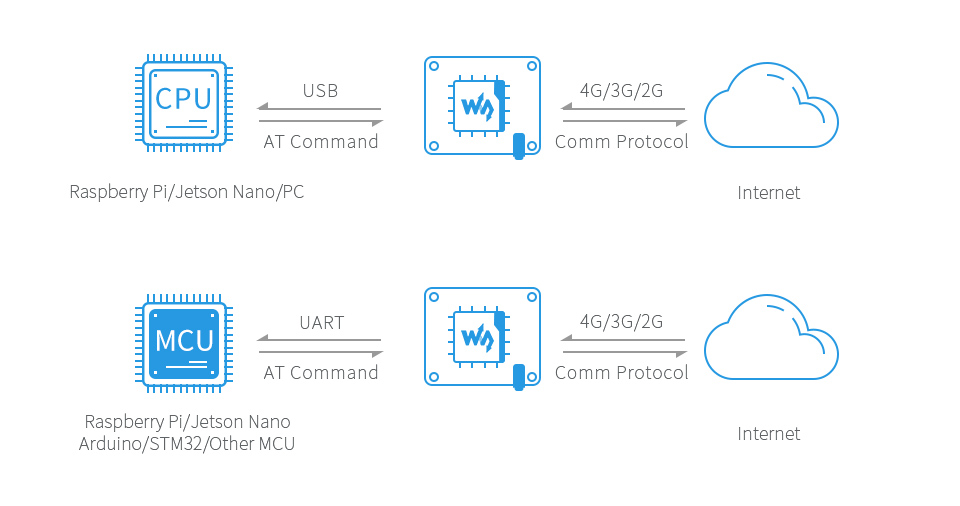
Supports GPS, BeiDou, Glonass, GALILEO, QZSS, LBS Base Station Positioning

Making Telephone Call Or Sending SMS By AT Commands, With Onboard Audio Jack
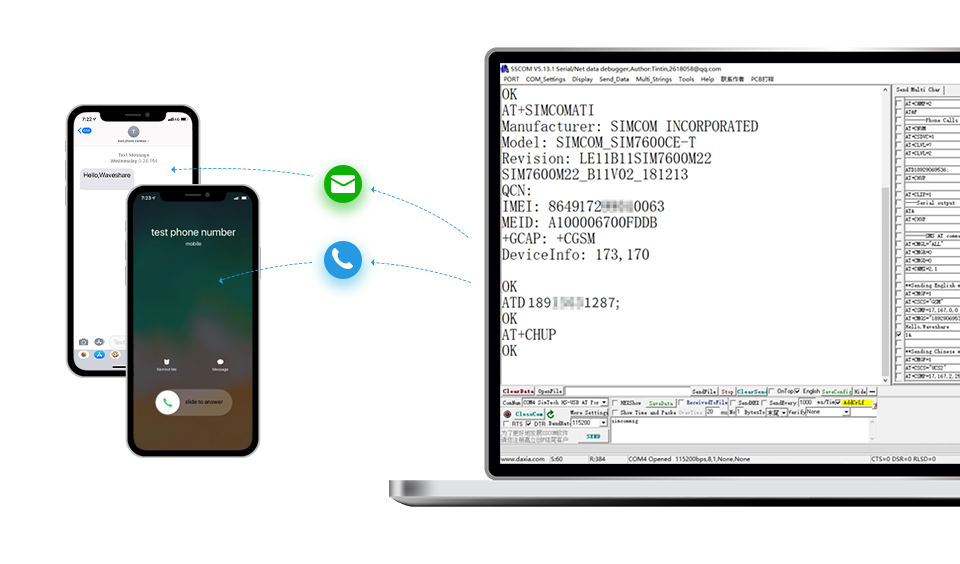
What's On Board
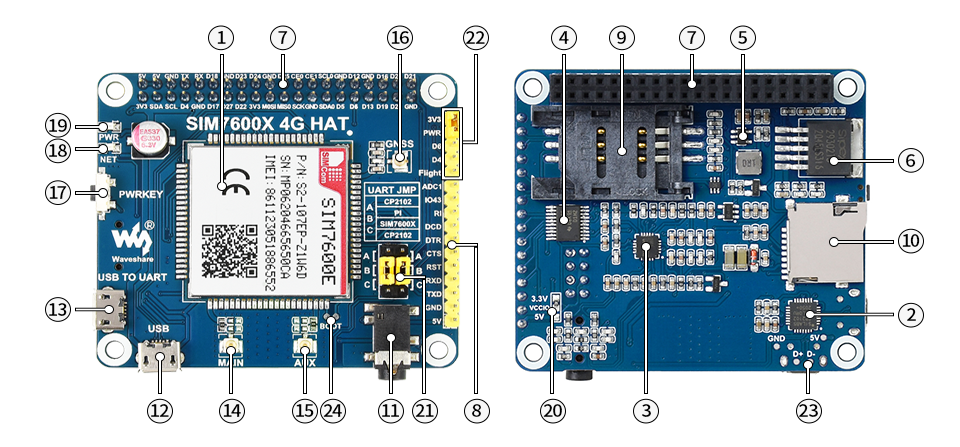
- SIM7600E
- CP2102 USB to UART converter
- NAU8810 audio decoder
-
TXS0108EPWR voltage translator
translates 3.3V/5V into 1.8V - MP2128DT power chip
- SPX29302 power chip
- Raspberry Pi GPIO header
-
SIM7600 control interface
for connecting with host boards like Arduino/STM32 -
SIM card slot
supports 1.8V/3V SIM card -
TF card slot
for storing data like files, messages, etc. -
3.5mm earphone/mic jack
for audio actions like making a telephone call -
USB interface
for testing AT Commands, getting GPS positioning data, etc. -
USB TO UART interface
for serial debugging, or login to Raspberry Pi
- MAIN antenna connector
- AUX antenna connector
- GNSS antenna connector
- Module power switch
- Network status indicator
- Power indicator
-
Operating voltage selection jumper
configured via 0Ω resistor jumper
VCCIO - 3.3V: set operating voltage as 3.3V
VCCIO - 5V: set operating voltage as 5V -
UART selection jumper
A: access Raspberry Pi via USB to UART
B: control the SIM7600 with Raspberry Pi
C: control the SIM7600 via USB to UART -
PWR configuration jumper
PWR - 3V3: auto startup on power-up (default)
PWR - D6: startup/shutdown by the Raspberry Pi D6 pin
Flight mode configuration jumper
NC by default, no flight mode control pin
Flight - D4: flight mode is controlled by the Raspberry Pi D4 pin - USB connector solder pads
- BOOT forced programming solder pads
Pinout Definition
